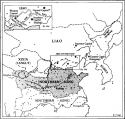As an ethnic Han Chinese in Taiwan, I have to disagree with the answers that affirm to the idea of China being historically a “peaceful power.” The majority in China probably learned the “alternative version.” I don’t know how mainland China teaches it, but I can give you a summary of what we learned in Taiwan.
The Shang people were a militant nation, they raided “barbarians” and mutilated them, even offered them to Di (帝). In the end, the Shang were overthrown by the Zhou people, who brought in a different culture and beliefs though they spoke a similar language (both Sinitic). The King of Zhou divided lands among his subjects, elevating their status to feudal lords. However, the Zhou continued the practice of raiding southern “barbarians” outside of the realm who, unlike the nomadic raiders in the north, were the receiver of foreign pillaging. These “southern barbarians” mixed with the Chu state, who was also looked down upon by the other states of Zhou for being affiliated with barbarian cultures and for having an “impure” noble lineage. The Chu rebelled and declared their own King in the South, but was crushed by the Qin in the end. The Qin was highly militant. With a warrior ideology and Legalist philosophy, the Qin standardized military equipments and prepared for endless battles. As the Qin launched counterattacks to the North, it simultaneously began to campaign in the South to gain more “living space.”
The Qin general Zhao Tuo later completed the task, and began the Chinese colonization of the South. Yet again, the South gained its independence as it became disconnected with the North when the Han overthrew the Qin. But the Han, too, began a journey to recapture the Southern Kingdom, then proceeded to further colonization by launching many more. To the North, the Han merely retaliated against the Xiongnu, who continuously raided the Han border. Centuries later, the Han collapsed into a blood civil war known as the Three Kingdoms period. Alas, the Wei had reunified China, but quickly it was usurped by the House of Sima Yi, founding the Jin dynasty.
The Jin marked the start of another chaotic era, as the barbarians to the North unified as a confederation and successfully invaded China Proper. The barbarians pushed the legitimate Chinese state to the south, then split again into many states occupying Northern China. Finally, one of the Northern states grew powerful and swallowed the South, leaving the Northern and Southern dynasties period to the Sui dynasty.
The Sui was founded by a general who “usurped” the throne, and the dynasty too maintained aggressive policies against the giant in the North, Goguryeo. However, the Chinese defeat became one of the factors which led to the downfall of Sui. The Tang resumed the failed legacy of the Sui and regained Chinese glory by successfully conquering Goguryeo, which completely annihilated them.
So why do so many Chinese in China believe Ancient China was peaceful when no ancient state was? One word, politics. The People’s Republic of China claims to be disconnected from its feudal past. Furthermore, the state ideology is founded on the principle that it is a state of multiple ethnicities. Hence, the historical view of the PRC is that all of these invasions in the past were “internal affairs” of the 55+1 ethnic groups, such as civil war, local rebellion, and pacification.
But this is pure bullshit. Historical revisionism in mainland China is so far deviated from the actual facts, to the extent that they categorize the Khitan and Jurchen invasions of Song China as a matter of civil war. But Chinese history must appear to be “peaceful” at all cost, because the truth that tells otherwise is an obstacle to the so-called “ethnic harmony” promoted by the Communist Party of China. The fact that one ethnic group had been a historical enemy of another in a certain period of time is the inconvenient truth in mainland Chinese politics. Did the Mongols invade the Song dynasty? No. It was just a dynastic transition, and Mongols are Chinese too. Did the Manchus invade the Ming? No, again. It was just a transition, and Manchus are now Chinese so no need to bring this up. Do you see the pattern?

